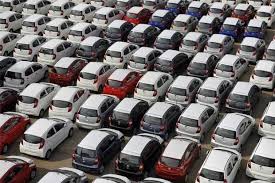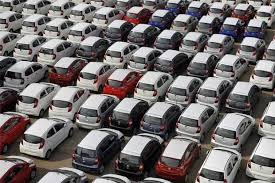
The Indian auto sector is going through its biggest slump in nearly two decades with dealerships are being pushed out of business across India. In June marked the eight straight month of a drop in sale of passenger vehicles while there was a monthly drop of 20.55 per cent in May this year which is the highest such drop in about 18 years.
In July, there was a potential drop of as much as 30 per cent in passenger vehicle sales according to preliminary data. Coupled with a drop in sale of cars and other vehicles in China, the slump in the Indian auto market is a major blow to auto makers as they are already facing challenges of higher costs and in investments for development of technologies to meet stringent emission norms and for production of electric cars.
There are a number of factors that have led to the slump in the Indian auto market which is unlike of what is happening in China where the cause of the drop in demand is primarily because of new emissions rules.
The factors driving a continued cycle of lower auto sale in India include a weak rural economy, the growing popularity of ride-sharing services such as Uber and Ola, higher tax rates under a new goods and services tax regime sand the 2016 ban on high-value bank notes.
However, an increasing liquidity crunch among shadow banks is being considered to be the major reason for the current spiral of lower sale and demand of cars and other vehicles in India, say many dealers and automakers. According to many analysts, this sharp and continued drop in demand and sale could lead to a million of job losses.
In late 2018, following the collapse of one of the biggest Non-banking finance companies (NBFCs) IL&FS, there has been a dramatic drop in their lending. NBFCs are also known as shadow banks because they are not like conventional banks.
A number of tools such as collective investment vehicles, broker-dealers or funds that invest in bonds and money markets are used by the non-bank or shadow banking firms for generating credit in addition to those done by conventional and traditional banks. .
According to rating agency ICRA, funding of almost 55 to 60 per cent of both new and used of commercial vehicles has been done in recent years by NBFCs in India. They also account for funding and financing for 30 per cent of passenger cars and almost 65 per cent of the two-wheelers in the country.
Additionally, conventional banks have also started to bring down their exposure ot the auto industry because of the current stress in the auto market.
"The car doesn't sell, it's the finance that sells," said R Vijayaraghavan, a senior marketing consultant at the same Mumbai dealership. "Today the finance is not selling, so the cars are not selling."
"The slowdown in the (NBFC) sector has dragged down vehicle sales growth," said AM Karthik, financial sector head at ICRA. "Now the auto slowdown is becoming more visible as the liquidity squeeze continues."
(Source:www.ndtv.com)
In July, there was a potential drop of as much as 30 per cent in passenger vehicle sales according to preliminary data. Coupled with a drop in sale of cars and other vehicles in China, the slump in the Indian auto market is a major blow to auto makers as they are already facing challenges of higher costs and in investments for development of technologies to meet stringent emission norms and for production of electric cars.
There are a number of factors that have led to the slump in the Indian auto market which is unlike of what is happening in China where the cause of the drop in demand is primarily because of new emissions rules.
The factors driving a continued cycle of lower auto sale in India include a weak rural economy, the growing popularity of ride-sharing services such as Uber and Ola, higher tax rates under a new goods and services tax regime sand the 2016 ban on high-value bank notes.
However, an increasing liquidity crunch among shadow banks is being considered to be the major reason for the current spiral of lower sale and demand of cars and other vehicles in India, say many dealers and automakers. According to many analysts, this sharp and continued drop in demand and sale could lead to a million of job losses.
In late 2018, following the collapse of one of the biggest Non-banking finance companies (NBFCs) IL&FS, there has been a dramatic drop in their lending. NBFCs are also known as shadow banks because they are not like conventional banks.
A number of tools such as collective investment vehicles, broker-dealers or funds that invest in bonds and money markets are used by the non-bank or shadow banking firms for generating credit in addition to those done by conventional and traditional banks. .
According to rating agency ICRA, funding of almost 55 to 60 per cent of both new and used of commercial vehicles has been done in recent years by NBFCs in India. They also account for funding and financing for 30 per cent of passenger cars and almost 65 per cent of the two-wheelers in the country.
Additionally, conventional banks have also started to bring down their exposure ot the auto industry because of the current stress in the auto market.
"The car doesn't sell, it's the finance that sells," said R Vijayaraghavan, a senior marketing consultant at the same Mumbai dealership. "Today the finance is not selling, so the cars are not selling."
"The slowdown in the (NBFC) sector has dragged down vehicle sales growth," said AM Karthik, financial sector head at ICRA. "Now the auto slowdown is becoming more visible as the liquidity squeeze continues."
(Source:www.ndtv.com)





